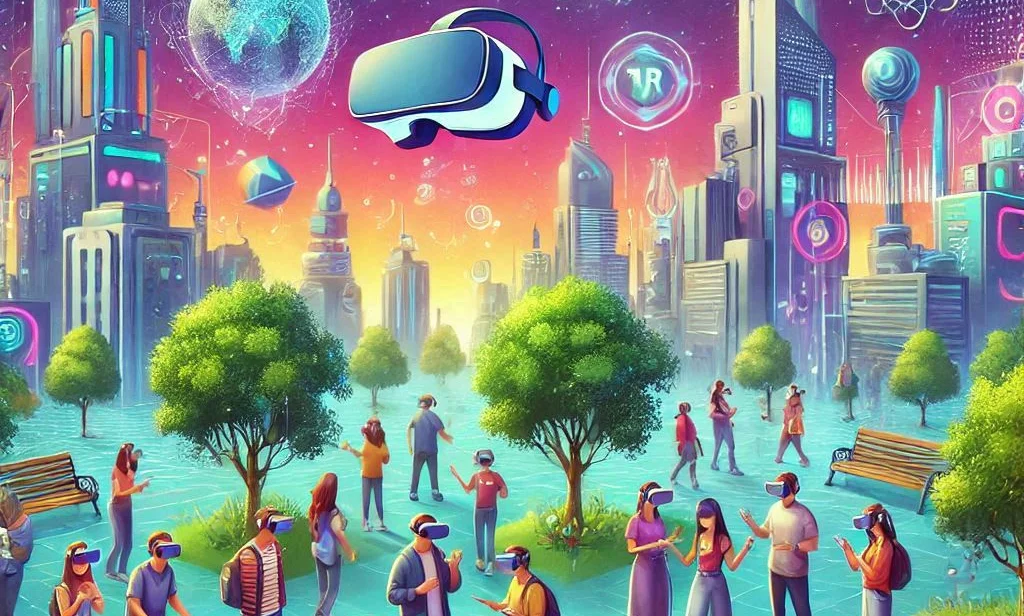The rapid evolution of virtual reality and the idea of the metaverse have presented unparalleled opportunities in how we interact, socialize, and conduct business in digital spaces. Right at the very core of this change is blockchain technology, which is revolutionizing the governance and development of virtual ecosystems. One of the most promising applications of blockchain to the VR metaverse is the decentralized autonomous organization, an innovative structure that governs the democratic process and facilitates collaborative development. This means that with DAOs, metaverse communities can achieve transparency, inclusivity, and efficiency in ways that traditional centralized systems cannot.
Decentralized Governance for Digital Communities
DAOs enable decentralized governance, a critical feature for fostering trust and autonomy in virtual communities. Unlike traditional organizational structures that rely on hierarchical leadership, DAOs operate on blockchain-based smart contracts, where decision-making processes are encoded and enforced automatically. In the context of VR metaverses, DAOs empower community members to participate actively in the governance of shared spaces, assets, and experiences. For instance, decisions regarding the design, rules, and features of a virtual cityscape can be made collectively by stakeholders rather than a central authority.
The transparency of a DAO ensures that all votes and transactions are immutably recorded on the blockchain, which can significantly reduce the risk of corruption or bias. It is democratic in nature, aligning with the core ethos of the metaverse: creating open and inclusive environments where users have equal rights to contribute and shape their experiences. Blockchain development companies have a crucial role in creating secure and strong smart contracts underpinning such DAOs, ensuring smooth and reliable operations.
Funding and Resource Allocation
One of the most significant challenges in building and maintaining VR metaverse spaces is funding. DAOs provide an innovative solution by pooling resources from members and allocating them democratically. Members of a DAO can propose projects, such as creating new virtual environments or enhancing existing ones, and vote on how funds should be distributed. This model not only ensures accountability but also encourages creativity and collaboration among community members.
For example, a DAO dedicated to a VR gaming metaverse could allocate resources to hire VR game development company for creating immersive gaming experiences. By involving the community in decision-making, DAOs eliminate the inefficiencies and mismanagement often associated with centralized funding processes. This participatory approach fosters a sense of ownership and investment among members, further strengthening the community.
Tokenized Economies and Incentive Structures
DAOs enable tokenized economies in VR metaverses where users will be able to earn, trade, and spend digital tokens as part of participating in them. These digital tokens often have two distinct functions: as a unit of account for transactions within the economy and as a unit of voting power in decentralized governance. For example, as in the case of users who contribute valuable content or governance, rewards can be earned in terms of tokens to incentivize such activities.
Moreover, the tokenized economy allows for the perfect fusion of real and virtual economies. Users can monetize their skills, services, or virtual assets to create sustainable streams of income. Systems like these are very important for top metaverse development companies looking to create thriving digital ecosystems that attract and retain users. In addition, by integrating DAOs with tokenized economies, these companies ensure that value generation and distribution are done in a fair and transparent manner.
Collaboration Beyond Boundaries
One of the most compelling aspects of DAOs is their ability to bring people together from all walks of life and across geographies. In a VR metaverse, this global collaboration becomes even more powerful. DAOs give a structured framework for coordination, allowing contributors from all over the world to work together toward common goals. Whether designing a new virtual reality game or establishing governance policies for a virtual city, DAOs lower traditional barriers to collaboration.
For example, a DAO may collaborate with a blockchain development firms in the integration of more complex blockchain features into the metaverse or collaborate with developers to create innovative VR tools. Pooling expertise and resources, DAOs hasten the pace of innovation while keeping the approach decentralized and inclusive.
Challenges and Limitations
While DAOs have a host of benefits, they aren’t without challenges. Designing and implementing the complex smart contracts that will accurately handle the nuances of governance and decision-making within the VR metaverse is difficult. Errors in coding or vulnerabilities in the blockchain may cause significant risks, including financial losses or governance failures.
It would also take some time and effort to achieve consensus among the diverse stakeholders. In certain cases, the democratic nature of DAOs could even degenerate into decision-making paralysis or inefficiency. Both of these challenges require a combination of strong technology solutions and engaged communities to solve.
DAOs in the Metaverse: Their Future
With the further development of the metaverse, the role of DAOs in shaping its future can only increase. DAOs provide a blueprint for sustainable and inclusive virtual communities, built on top of transparent governance, efficient resource allocation, and tokenized economies. It will be very important to collaborate with leading metaverse development companies in overcoming technical and operational challenges that ensure these systems can scale.
Furthermore, advanced AI technologies and machine learning could be integrated with DAOs to further enhance their potential. For example, analysis of voting patterns by AI could give insights for making better decisions or automate simple tasks within the DAO, hence improving efficiency.
In conclusion, DAOs represent a paradigm shift in how we build and govern virtual spaces. By leveraging blockchain technology and fostering collaborative ecosystems, they pave the way for a more equitable and inclusive metaverse. As stakeholders explore further and innovate, the combination of DAOs and VR metaverses is bound to redefine our digital future by opening up new possibilities for interaction, creativity, and economic growth.







